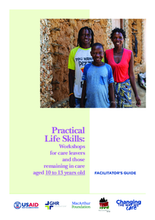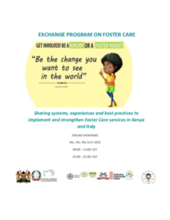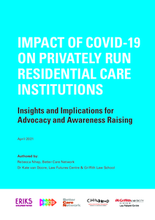This country page features an interactive, icon-based data dashboard providing a national-level overview of the status of children’s care and care reform efforts (a “Country Care Snapshot”), along with a list of resources and organizations in the country.
demographic_data
childrens_living_arrangement
children_living_without_bio
adoption
social_work_force
key_stakeholders
Key Stakeholders
Add New DataOther Relevant Reforms
Add New Datadrivers_of_institutionalisation
Drivers of Institutionaliziation
Add New Datakey_research_and_information
Key Data Sources
Add New DataChildren's Act, 2022 (Kenya)
Prevalence and number of children living in institutional care: global, regional, and country estimates
Social Protection and Disability in Kenya
Kenya Social Protection Sector Review
Country Care Review: Kenya
Child Developmental Disabilities, Caregivers’ Role in Kenya and Its Implications on Global Migration
Research findings on Alternative care system in Kenya for children without parental care
Charitable Children Institutions in Kenya: Factors Influencing Institutionalization of Children
Acknowledgements
Data for this country care snapshot was contributed by consultants with Maestral International.
Displaying 171 - 180 of 447
This series of resources are designed by care leavers for care leavers to help equip youth for life outside of care, strengthen coping strategies, foster safety nets and community networks. It builds from earlier life skills work that the Kenyan Society of Care Leavers has done, supported by Changing the Way We Care with global best practices.
UNICEF is advertising this individual consultancy for the purpose of putting in place technical guidance note and policy directive in support as well as develop a range of child and family package that will support the family based care of children with disabilities.
UNICEF is seeking a consultant to provide Technical Assistance to the Kenyan State Department of Social Protection in the Ministry of Labour and Social Protection on the implementation of the care reform strategy.
These presentations from UNICEF and Alternative Care Thailand were delivered during the July 9, 2021, workshop of the Care Measurement Task Force of the Transforming Children's Care Global Collaborative Platform. The focus of the workshop was on care measurement initiatives in Eastern and Southern Africa and Thailand.
The Kenya-Italy “Virtual Exchange Program on Foster Care” aims to create a platform for learning, networking and sharing knowledge and best practices on Foster Care among different government stakeholders, from Kenya and Italy.
The exchange program took place on 5th, 7th and 9th July 2021.
"SOS Children’s village has apologised for what it terms as 'failures to prevent children from being abused'" in response to the unmasking of "rampant cases of child abuse, corruption and breaches to protect the children's rights" in its Kenya centers, according to this article from the Standard.
This webinar, informed by both detailed case studies developed by the Aga Khan Development Network and UNICEF programme implementation in Zambia with the support of the LEGO Foundation, provided a unique opportunity to engage with and understand the experiences of government, development partners, civil society, frontline health workers, and parents in Eastern and Southern Africa.
This study explores the effect of COVID-19 on a small number of privately run and funded residential care institutions by conducting a qualitative research study comprising 21 semi-structured interviews across seven focus countries.
In this webinar, UNICEF’s Lauren Rumble and Alessandra Guedes describe how violence in childhood is gendered, introduce the links between violence against women and children, and share effective gender-transformative strategies.
In this opinion piece for the Standard, Fredrick Mutinda of Changing the Way We Care describes the negative impacts that institutionalization has on children and the efforts to reform the care system in Kenya.



